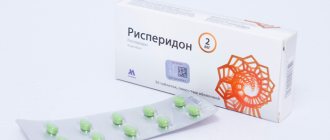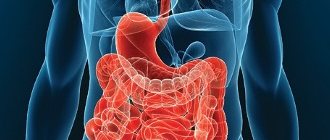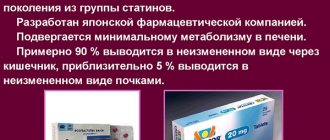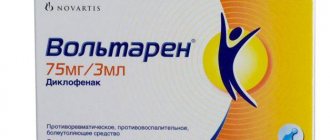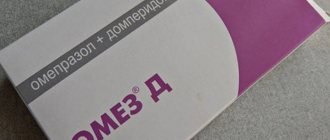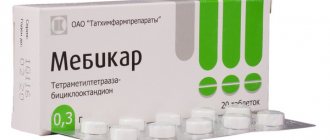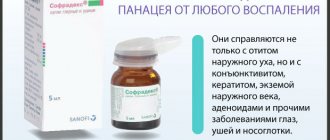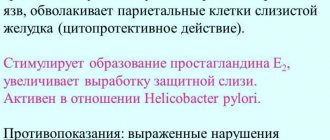Prohibited during pregnancy
Prohibited during breastfeeding
Has restrictions for children
Has restrictions for older people
Has limitations for liver problems
Thioridazine is an antipsychotic drug with tranquilizing properties, antipruritic and antidepressant effects. The active component in the medicine is thioridazine, which in small doses affects the body as an anxiolytic, and in higher doses as an antipsychotic drug. The medicine is produced in tablets.
If the patient is allergic to thioridazine, analogues with a different composition of components are prescribed; there are also generics of the drug that are slightly cheaper.
Packaging of the drug Thioridazine
The drug is used in the treatment of such diseases:
- psychotic disorders with psychomotor overexcitation;
- behavioral disorders in neurological pathologies;
- neuroses and depression, which are accompanied by agitation, mental stress, fear and anxiety.
Thioridazine is not prescribed for:
- allergies to the medicinal composition;
- severe depression and severe central nervous system depression;
- history of blood pathologies;
- state of coma;
- severe cardiac and systemic pathologies;
- hypertension;
- brain pathologies;
- TBI;
- liver failure.
Thioridazine is also not used in pediatric practice under 3 years of age and during lactation. During pregnancy, medication is prescribed as a last resort and for vital signs.
The drug is taken orally according to an individual dosage and treatment regimen. Initial dosages for patients over 12 years of age start at 50-100 mg three times a day.
If necessary, the doctor can increase the daily dosage to a maximum of 800 mg. Patients under 12 years of age are prescribed a dosage in accordance with the child’s weight - 0.5-3 mg per 1 kg of weight. For elderly patients, as well as with pathologies of the liver and kidneys, dose adjustment is necessary.
Chemical properties
Thioridazine is an antipsychotic drug. It has antipsychotic and moderate antidepressant effects. In the form of hydrochloride , it is a white powder that is highly soluble in water and ethyl alcohol, chloroform , methanol , and insoluble in ethers . The drug is produced in the form of film-coated tablets with different dosages. Due to the high incidence of life-threatening arrhythmias and retinopathy , the drug is used strictly according to indications and when other drugs are ineffective. In some countries the medicine has been withdrawn from circulation.
Similar drugs:
- Eglonil Oral tablets
- Finlepsin Oral tablets
- Moditen depo Solution for intramuscular administration
- Egolanza Oral tablets
- Rispaksol Oral tablets
- Thiodazine Oral tablets
- Closasten (Closastene) Oral tablets
- Clopixol Depot Solution for intramuscular administration
- Leponex Oral tablets
- Risperidone Oral tablets
** The Drug Directory is intended for informational purposes only. For more complete information, please refer to the manufacturer's instructions. Do not self-medicate; Before starting to use the drug Thioridazine, you should consult a doctor. EUROLAB is not responsible for the consequences caused by the use of information posted on the portal. Any information on the site does not replace medical advice and cannot serve as a guarantee of the positive effect of the drug.
Are you interested in the drug Thioridazine? Do you want to know more detailed information or do you need a doctor's examination? Or do you need an inspection? You can make an appointment with a doctor - the Euro lab is always at your service! The best doctors will examine you, advise you, provide the necessary assistance and make a diagnosis. You can also call a doctor at home . Euro lab clinic is open for you around the clock.
** Attention! The information presented in this medication guide is intended for medical professionals and should not be used as a basis for self-medication. The description of the drug Thioridazine is provided for informational purposes and is not intended for prescribing treatment without the participation of a doctor. Patients need to consult a specialist!
If you are interested in any other drugs and medications, their descriptions and instructions for use, information about the composition and form of release, indications for use and side effects, methods of use, prices and reviews of drugs, or you have any other questions and suggestions - write to us, we will definitely try to help you.
Pharmacodynamics and pharmacokinetics
The mechanism of action of Thioridazine is based on the ability of the drug to disrupt adrenergic and dopaminergic transmission of nerve impulses, especially in the reticular formation of the brain. The substance eliminates the activating effect on the limbic system and cerebral cortex. The drug provides blocking of m-cholinergic receptors , significantly reducing the activity of the autonomic nervous system.
The chemical compound affects various psychomotor functions, reduces general arousal, mobility, eliminates agitation and the degree of affective tension. The medicine also has a sedative effect, but does not lead to general lethargy and lethargy. It has some antidepressant and activating effects, moderate sedative and anticholinergic. Does not have a cataleptogenic effect, reduces blood pressure .
After taking the tablets, their contents are quickly absorbed in the digestive tract. The maximum concentration is observed after 1-4 hours. The drug quickly overcomes the histohematic barriers, the blood-brain and placental barriers, and is excreted in breast milk. The product has a high degree of bioavailability.
Metabolized in the liver with the participation of the cytochrome CYP2D6 to sulforidazine and mesoridazine (active metabolites). The half-life from the body ranges from 6 to 40 hours. The medicine is excreted through the kidneys, with bile. The mesoridazine metabolite is more active than the substance itself; it has a longer elimination time from the body, but a lower degree of binding to blood proteins.
Analogues of Thioridazine in composition
Structural analogues of the drug are thioridazine-based products, which are manufactured by different pharmaceutical companies. The effectiveness of such analogues is almost the same, because these generics contain the same active component.
Sonapax
Sonapax is an antipsychotic drug that is prepared in tablets with the main ingredient - thioridazine hydrochloride. Sonapax is used for:
- schizophrenia with paranoid thoughts;
- involutional psychosis and psychosomatic disorder;
- depression, which is accompanied by anxiety and fear;
- withdrawal syndrome;
- allergic itching with skin dermatitis;
- increased psychomotor activity in children and adolescents.
The medication is not prescribed for:
- allergies to ingredients;
- severe state of depression;
- coma and pheochromocytoma;
- disturbances in hemostasis;
- porphyria.
Also not prescribed in pediatrics up to 4 years of age, during lactation. Not prescribed to pregnant women in the 1st trimester and in the last 7-10 days of pregnancy.
The dragee is taken orally according to individually prescribed dosages. Average daily dosages of Sonapax:
- agitation, mania, schizophrenia and depression - 250-800 mg per day. Medication course – 1-4 months;
- in old age – 30-100 mg;
- emotional disturbances (depending on severity) – 30-200 mg;
- psychosomatic changes – 10-75 mg. Maximum 200 mg.
Children are prescribed medications depending on their age.
Negative reactions:
- lethargy and drowsiness;
- dizziness and depression;
- dyspepsia;
- anemia, blood pressure fluctuations and tachycardia;
- fluid retention in the body;
- skin allergies and bronchospasms.
Thiodazine
Thiodazine is a structural analogue of Thioridazine with an identical composition. The medication is prepared in tablets and prescribed for:
- depression and schizophrenia with syndromes of fear, causeless worry and anxiety;
- behavioral disorders in the elderly and children;
- mental retardation in children and dementia in the elderly;
- sleep rhythm disturbances and problems falling asleep;
- deviations in thinking, decreased intelligence and memory;
- alcohol withdrawal.
Do not take Thiodazine if:
- allergies to the medicinal composition;
- severe depression of the central nervous system and severe depression;
- blood pathologies;
- severe cardiac pathologies and disorders in the blood flow system;
Prescribe with caution when:
- pregnancy, as well as during hepatitis B;
- epileptic seizures;
- oncological tumors in the breast;
- glaucoma;
- prostatitis;
- liver and kidney dysfunction.
Dosages are prescribed strictly individually based on the pathology, the degree of its progression, the characteristics of the patient’s body and the positive dynamics in therapy. The minimum daily dose is 10 mg, and the maximum is 800 mg.
Negative reactions:
- drowsiness, headache, irritability;
- dizziness, blurred vision, depression, hallucinations;
- dyspepsia;
- menstrual irregularities, erectile dysfunction and impotence;
- skin allergy.
Thioril
Thioril is a tranquilizer with antipsychotic properties with the active ingredient thioridazine. The drug has a sedative effect, but does not cause increased drowsiness, lethargy, fatigue or lethargy. Manufactured in tablets.
Prescribed for:
- mental, neurological and emotional disorders that provoke the development of overstrain and overexcitation, anxiety, fear and paranoia;
- alcoholic psychoneuroses;
- behavioral and mental disorders in children;
- senile dementia (dementia).
It is prohibited to use the medication if:
- hypersensitivity to the drug composition;
- severe development of depression;
- coma;
- cardiovascular pathologies and depression of the nervous system.
It is also not prescribed in pediatrics to children under 2 years of age or when a child is pregnant or pregnant.
The daily dosage of the medicine is divided into 2-3 doses. Doses depend on the pathology and the phase of its progression:
- emotional overstrain – 30-75 mg. The medication course lasts 2-3 months;
- psychoneuroses of alcoholic etiology – 25-100 mg.
Children aged 2-12 years are prescribed 0.25-2 mg per 1 kg of weight.
Side symptoms:
- dyspepsia;
- body fatigue and dizziness;
- drowsiness;
- changes in heart pressure and rhythm;
- skin allergies;
- swelling.
Melleril
Melleril is a generic version of Thioridazine with an identical composition of components. The drug inhibits adrenergic and dopaminergic impulse transmission. The medicine is prepared in tablets and prescribed for the development of such pathologies of the nervous system and psyche:
- affective insanity;
- neurosis;
- schizophrenia;
- mental overexcitation, anxiety syndrome and fear;
- abstinence from alcoholism, drug addiction, substance abuse;
- psychomotor overexcitement.
The medication is not prescribed for:
- hypersensitivity to the drug composition;
- severe systemic and cardiac pathologies;
- coma;
- head and brain injury;
- systemic diseases of the brain and spinal cord;
- oppression of NS centers.
It is also not prescribed for women with breastfeeding, pregnancy, or children under 2 years of age.
The medicine is prescribed to be taken orally. The doctor sets the dosage individually for each patient. Standard doses of Melleril in the treatment of such diseases:
- manic-depressive psychosis, schizophrenia, depression – 150-400 mg (outpatient, 250-800 mg (inpatient);
- emotional overstrain – 30-200 mg (depending on the degree of progression);
- children are prescribed according to age. Average daily doses are 10-50 mg.
Side effects:
- dyspepsia, jaundice;
- insomnia, agitation, hallucinations, fainting;
- parkinsonism, photophobia;
- dysmenorrhea;
- anemia, tachycardia and decreased blood pressure;
- bronchospasms;
- hyperemia, rash and itching of the skin.
See also:
TOP 10 analogues of Chlorprothixene - substitutes for children and adults
Indications for use
The medicine is prescribed:
- for the treatment of psychotic disorders and schizophrenia , which are accompanied by excessive agitation and hyperactivity ;
- for severe behavioral disorders, aggression, frustration, inability to concentrate, associated with psychotic disorders and neurological diseases;
- patients with severe or moderate depression in adults;
- for neuroses with agitation, anxiety, tension, insomnia , fears;
- for the treatment of Huntington's disease .
Reviews on the choice of Thioridazine analogues
Labunets I.A., psychiatrist: “For patients with schizophrenia, which is accompanied by increased aggression and irritability, I prescribe Thioridazine. With a short course of medication, he is able to stop attacks of severe psychosis. Among the analogues of the drug, I can mention Sonapax, Thioril with an identical composition, as well as products with a similar effect Invega, Amdoal.”
- Elizaveta, 34 years old: “At the first signs of exacerbation of psychosis, the doctor prescribes Thioridazine to me. I take it for 1-2 months and for 8-9 months I forget that I have mental problems. The drug does not cause drowsiness and during the therapy period I continue to work as a controller at the ATP.”
Veniamin, 29 years old: “I was diagnosed with schizophrenia 3 years ago after a severe stressful situation and brain injury. I undergo treatment with Thioridazine 2 times a year. I feel good and even suspect that I was misdiagnosed. This is a truly effective medication. After the therapeutic course, I become calm, balanced, and my thinking improves. The doctor doesn’t recommend changing it yet.”
Thioridazine is an antipsychotic that quickly and effectively relieves attacks of psychosis and schizophrenia. If you are allergic to the active ingredient, your doctor will select effective and safe analogues.
Contraindications
Thioridazine is not recommended for use:
- for acute depression ;
- patients in a coma , with severe depression of the central nervous system;
- for severe diseases of the heart and blood vessels, blood diseases ( arterial hypertension , chronic heart failure, arterial hypotension , arrhythmia );
- children under one year old;
- if you are allergic to a substance;
- patients with traumatic brain injury;
- in combination with drugs that prolong the QT interval, with CYP2D6 ;
- for porphyria , pregnancy and breastfeeding.
There are also some restrictions when treating the following groups of patients:
- alcoholics;
- patients with hematopoietic disorders;
- breast cancer patients ;
- patients with angle-closure glaucoma , prostatic hyperplasia ;
- patients with renal and liver failure, epilepsy , myxedema ;
- ulcers, especially during exacerbation;
- patients with chronic diseases that are accompanied by impaired respiratory function;
- patients with Reye's syndrome and the elderly.
Similar remedies in other forms
There are similar preparations of Thioridazine, which are manufactured in other dosage forms - capsules, oral solution and injection solutions.
Zeldox
It is produced in capsules and lyophilisate for the preparation of a solution for intramuscular administration with the active ingredient - ziprasidone. Zeldox is prescribed for:
- schizophrenia;
- manic episodes;
- mixed type psychoses;
- bipolar disorders.
It is not recommended to prescribe Zeldox for:
- intolerance to ingredients;
- severe cardiac diseases – arrhythmia, heart attack;
- joint therapy with Halofantrine, Mefloquine.
The drug is also not prescribed during pregnancy, pediatrics and lactation.
Capsules should be taken while eating. The regimen for taking capsules, dosage and duration of the therapeutic course are established by the doctor personally for each patient in accordance with the pathology and the stage of its progression. The maximum dosage per day should not be higher than 160 mg. The medication is administered only intramuscularly and in dosages of 10-20 mg.
Side effects:
- allergic rhinitis, bronchospasms;
- allergic manifestations on the skin;
- dystonia, akathisia and parkinsonism;
- convulsions, paresthesia;
- hypertensive crisis and arrhythmia;
- dyspepsia.
Topral
The drug is an antipsychotic with a pronounced sedative effect, which quickly suppresses overexcitation and aggressiveness. It is not an antidepressant. Topral is produced in tablets and in a parenteral solution for intramuscular injections with the main component - sultopride.
A neuroleptic is prescribed for:
- manic syndrome in the acute phase of manifestation;
- schizophrenia;
- psychosis;
- alcohol aggression and overexcitement;
- anxiety syndrome.
Topral is not prescribed for:
- hypersensitivity to components;
- bradycardia and hypokalemia;
- disturbances in the conduction of impulses through the myocardium;
- depression and melancholy;
- epileptic seizures;
- lactation.
Prescribed with restrictions for:
- increased seizure threshold;
- decompensated pathologies of the heart and blood flow system;
- parkinsonism.
Intramuscularly prescribed three to four times a day. The interval between administration of the solution is 6 hours. The dose of medication per day is 0.4-1.6 g. After normalization of the condition – 0.4-0.6 g.
Negative reactions:
- increased drowsiness and lethargy;
- dizziness;
- anxiety and dyskinesia;
- arrhythmia and hypotension;
- overweight and dyspepsia;
- skin rashes, pale skin and itching.
Neuleptil
Neuleptil is produced in oral solution and capsules. The main ingredient is periciazine. The drug has an antipsychotic effect and eliminates increased aggressiveness due to the development of psychoses of various etiologies and schizophrenia.
Neuleptil is not prescribed for:
- allergies to ingredients in the medicine;
- Parkinson's disease;
- angle-closure glaucoma;
- levodopa therapy;
- heart failure;
- porphyria;
- prostatitis;
- pheochromocytoma;
- pathologies of the kidneys, heart, liver;
- systemic pathologies;
- lactation.
During pregnancy, Neuleptil is prescribed with great caution and under the supervision of a physician.
Dosages are prescribed by the doctor individually. Standard doses in therapy are 30-100 mg per day. The daily maximum is 200 mg. For children, 0.1-0.5 mg per 1 kg of weight is prescribed. Neuleptil is taken twice or thrice a day.
Adverse reactions:
- dyspepsia;
- hypotension and heart rhythm disturbances;
- apathy and depression;
- allergies to the epidermis;
- impotence and urine retention.
See also:
TOP 11 analogues of Tofizopam - substitutes for therapeutic effect
Side effects
During treatment with the drug, the following may occur:
- drowsiness , confusion , fainting, agitation , severe central nervous system agitation, hallucinations , sleep disturbances, convulsions , dystonia and parkinsonian extrapyramidal disorders;
- photophobia , vomiting, blurred vision, problems with thermoregulation, hyposalivation , indigestion , diarrhea or constipation , cholestatic hepatitis ;
- amenorrhea , gynecomastia , galactorrhea , dysmenorrhea , weight gain, swelling of the mammary glands;
- tachycardia , drop in blood pressure, changes in the electrocardiogram, leukopenia , agranulocytosis , thrombocytopenia ;
- pancytopenia , nasal congestion, dysuria , bronchospastic syndrome, urinary retention, priapism , sexual dysfunction, changes in libido ;
- skin rashes, dermatitis , Quincke's edema , swelling, melanosis of the skin.
Cases of sudden death of patients caused by disturbances in the functioning of the heart have been reported.
Side effects of the drug Thioridazine
Common side effects, especially when using a high dose and early in treatment, include drowsiness, sedation, dizziness, nasal congestion, and dry mouth. Dose-dependent orthostatic hypotension is sometimes observed, especially in elderly patients. Other dose-related effects associated with the anticholinergic activity of thioridazine include disturbances of accommodation, tachycardia, constipation, and urinary retention or incontinence. In some patients, thioridazine, even in low doses, can cause a feeling of mental depression, nausea, dizziness, headache, or, conversely, paradoxical effects of agitation, agitation or insomnia. In some cases, neuroleptic malignant syndrome (muscle rigidity, hyperthermia, mental status disorders, autonomic lability) was observed, requiring immediate discontinuation of thioridazine. When used in high doses, as with other phenothiazines, ECG changes of the repolarization type are described (lengthening of the Q-T , flattening of the T and appearance of the U ). These changes are most likely due to a decrease in potassium concentration in the blood. Like all phenothiazines, thioridazine can in rare cases provoke arrhythmias. Cases of sudden unexplained death, possibly due to arrhythmia or cardiac arrest, have been reported among patients receiving tricyclic antipsychotics, including thioridazine. When prescribing high (neuroleptic) doses of thioridazine, extrapyramidal symptoms are possible; when using low (anxiolytic) doses they are practically not observed. There have been reports of cases of pigmentary retinopathy during long-term treatment with thioridazine, mainly when taking more than 800 mg of thioridazine per day. Antipsychotic drugs such as thioridazine can cause hyperprolactinemia, leading to galactorrhea, menstrual irregularities, erectile dysfunction (weakness of erection or priapism) and ejaculation, and sometimes weight gain and edema. These effects can be prevented by reducing the dose of thioridazine. Rare cases of leukopenia and agranulocytosis, especially in the first months of treatment, photosensitivity, allergic rash, jaundice, hepatitis and liver dysfunction have been described.
Thioridazine, instructions for use (Method and dosage)
The medicine has an individual dosage regimen. The treatment regimen is determined by the attending physician, depending on many factors.
On average, adults over the age of 12 years are prescribed from 20 to 800 mg of the drug per day, 3 times a day. High dosages of medication can be prescribed for no more than 5 weeks.
For children, it is necessary to adjust the dosage depending on weight and age.
The maximum daily dosage for an adult (from 12 years old) is 0.8 g.
Popular analogues for therapeutic action
Therapeutic substitutes for Thioridazine are medications with a different composition, but with a similar therapeutic effect. The effectiveness of many of these analogues is no lower than the original drug, and some substitutes are even much more effective.
Amdoal
This is an atypical antipsychotic with the active ingredient aripiprazole. Amdoal is produced in tablets and is used for:
- schizophrenia;
- bipolar disorders type 1 with manic symptoms.
The drug is not prescribed in pediatric practice, in case of sensitivity to the ingredients in the composition, or in women who are pregnant or pregnant.
Prescribed with restrictions for:
- diabetes mellitus and overweight;
- cerebrovascular disorders;
- post-infarction period and in severe cardiac diseases;
- seizures and epilepsy;
- hyperthermic syndrome with dehydration.
- risk of developing aspiration pneumonia.
The tablets are taken orally. Dosages are prescribed only by the attending physician, depending on the pathology. Tablets are taken once a day:
- schizophrenia – 10-15 mg;
- bipolar manic disorders – 15-30 mg.
Patients with severe renal and hepatic pathologies need to adjust the dose.
Adverse reactions:
- increased bleeding;
- anemia, thrombocytopenia;
- arrhythmia, tachycardia;
- hypotension;
- dyspepsia, gastralgia, jaundice;
- bronchospasms;
- skin allergies;
- disturbances in the functioning of the central nervous system.
Saphris
Saphris is produced in sublingual tablets based on the main component - asenapine. Saphris is an antipsychotic drug whose mechanism of action is aimed at treating bipolar disorder and schizophrenia, as well as for relieving episodes of manic affective disorder.
The medicine is not prescribed if there is intolerance to the components in the medicine, as well as in pediatric practice, during lactation and for women during the period of bearing a child.
For the treatment of schizophrenia and bipolar affective disorder, 5 mg is prescribed twice a day, followed by an increase to 10 mg. The duration of the medication course is prescribed by the doctor personally for each patient.
For patients with kidney, heart and liver disorders, no adjustment is necessary.
Side effects:
- hypotension;
- drowsiness, hallucinations and dizziness;
- body fatigue and headache;
- dyspepsia, gastralgia and holistic jaundice;
- allergic itching, skin rashes;
- disturbance of heart rhythm.
Haloperidol
Haloperidol is produced in tablets and in a parenteral solution with the main ingredient haloperidol. Neuroleptic is prescribed for the treatment of chronic and acute phases of development of such pathologies:
- schizophrenia;
- manic-depressive psychosis;
- epileptic seizures;
- psychoses of alcoholic etiology;
- mental retardation and Huntington's chorea;
- agitated type depression;
- psychosomatic abnormalities;
- Tourette's pathology;
- stuttering, tics, behavioral disorders in children;
- patients undergoing chemotherapy (to prevent the development of vomiting and nausea).
Haloperidol is not prescribed for:
- severe forms of central nervous system depression of toxic origin;
- pathologies of the central nervous system that provoke hysteria, a severe phase of depression, coma;
- sensitivity to the drug composition.
The drug is not used in the treatment of children under 3 years of age, and is not prescribed to women during pregnancy and lactation.
Prescribed with great caution when:
- angle-closure glaucoma;
- systemic and cardiac diseases;
- liver failure and kidney dysfunction;
- insufficiency of the respiratory system;
- prostatitis and thyrotoxicosis;
- alcoholism.
The medicine can be taken 30 minutes before meals. Tablets are taken twice or thrice a day, 0.5-5 mg. A single dosage should not exceed 2 mg. The doctor may increase the daily dosage to 10 mg. The maximum permitted dose of 40 mg can be used only in a hospital and provided that the patient does not have chronic pathologies.
In pediatrics, doses are prescribed based on the child’s age and weight. Standard dosages for children are 0.025-0.075 mg.
Side effects:
- insomnia and dizziness;
- extrapyramidal disorders;
- poor coordination of movement and unsteadiness in gait;
- tremor of the limbs;
- dyspepsia;
- dermatological allergy.
Clopixol
This is an antipsychotic, which is produced in depot form, an oil-based injection solution, in tablets with the active ingredient - zuclopenthixol dihydrochloride. Clopixol is used in the treatment of the following pathologies:
- schizophrenia;
- oligophrenia;
- overstimulation of the psyche;
- manic-depressive states;
- paranoia;
- distorted behavioral reactions;
- hallucinations and delusions.
The medication is not prescribed for:
- intolerance to medicinal components;
- hepatitis;
- convulsions;
- cardiac disorders.
Prescribe with caution when:
- lactation;
- pregnancy;
- disorders of the kidneys;
- alcoholism.
Treatment begins with small doses, which are gradually increased to a therapeutic dose of 10-50 mg per day. For patients with liver pathologies, the dosage is reduced by half.
Adverse reactions:
- dyskinesia and ataxia;
- dizziness and lethargy;
- dyspepsia;
- urticaria and bronchospasms.
Invega
Invega is an antipsychotic medication that contains a racemic mixture of paliperidone. The principle of action of paliperidone is not similar to the action of antipsychotics.
Invega is prescribed for the treatment of schizophrenia or schizoaffective syndrome with manic symptoms. The medication is not effective in treating depression.
Do not use the medicine:
- with intolerance to ingredients;
- in pediatrics under 12 years of age;
- in the 1st and 3rd trimester of pregnancy and during pregnancy.
Use with restrictions for:
- severe cardiac disorders;
- diabetes mellitus;
- convulsions and dysphagia;
- renal and hepatic dysfunction;
- parkinsonism.
The dosage is prescribed individually, and it depends on the pathology and the stage of its development:
- dosage for the treatment of schizophrenia – 3-6 mg per day;
- The dosage is reduced by half in patients with renal and hepatic pathologies, as well as in patients over 65 years of age.
Adverse reactions:
- abdominal and epigastric pain;
- urticaria and skin itching;
- hyperemia of areas of the epidermis;
- bronchospasms;
- muscle spasms;
- heart attack, angina pectoris, arrhythmia;
- blood pressure fluctuations and dizziness.
Risperidone
The drug suppresses the symptoms of schizophrenia without reducing motor activity. It is produced in tablets based on the active component – risperidone.
A medication is prescribed for:
- schizophrenia in different phases of development;
- psychosis;
- affective disorders of various origins;
- manic-depressive syndrome;
- state of delirium, hallucinations and phobias;
- aggressiveness.
Prescribed for adolescents over 15 years of age with mental retardation and increased impulsiveness, nervousness and aggression.
Do not use the medication if you are allergic to the composition, as well as during lactation. During pregnancy, women are prescribed medication as a last resort, and only for vital reasons.
You need to take the medicine 1-2 times a day. Treatment should be started with a minimum dose of 2 mg, and after a day or two, the dosage should be doubled. If this dosage is not enough, then increase it to 6 mg. The maximum dose of medication per day for moderate severity of the pathology is 10 mg, for severe stage - 16 mg.
Children and adolescents weighing over 50 kg are prescribed Risperidone at a dose of 1 mg for 24 hours. For elderly patients and patients with liver and kidney dysfunction, the dosage is reduced by half.
Adverse reactions:
- dizziness, tremors of extremities, weakness in muscle fibers;
- hyperthermia;
- dyspepsia;
- heart rhythm disturbances and decreased blood pressure;
- problems in hemostasis;
- hives, severe itching;
- myalgia.
See also:
TOP 10 analogues of Pantogam - drug substitutes for therapeutic effect
Interaction
Simultaneous use with drugs that depress the central nervous system and ethyl alcohol leads to increased sedative properties of the drug.
The medicine reduces the effectiveness of anticonvulsants and cimetidine .
Thioridazine enhances the effect of anticholinergics and sympathomimetics.
The combined use of the drug with drugs that lower blood pressure leads to an even greater decrease in blood pressure and the development of orthostatic hypotension .
When combined with appetite suppressants other than fenfluramine , this substance significantly reduces their effectiveness.
Simultaneous use of the drug with anticoagulants leads to a decrease in their effectiveness; with antithyroid drugs – to the development of agranulocytosis ; with beta-blockers - leads to increased hypotensive effect. The drug increases the risk of arrhythmias , tardive dyskinesia , and retinopathy .
Hypoglycemic agents lose their effectiveness when used with Thioridazine.
The combined use of the drug with amphetamine leads to a mutual weakening of the properties of both drugs.
With the simultaneous use of this substance and apomorphine , the emetic effect of the latter is reduced and the sedative effect is enhanced.
The medicine causes an increase in the concentration of prolactin in the blood and reduces the effectiveness of bromocriptine .
The drug can reduce the effectiveness of levodopa and guanethidine .
The combined use of the drug with probucol , cisapride , astemizole , disopyramide , pimozide , erythromycin , procainamide leads to prolongation of the QT interval and the development of ventricular tachycardia .
Thioridazine reduces the rate of absorption of lithium salts from the digestive tract and increases the rate of excretion of lithium ions from the body. The drug is also able to mask some signs of acute lithium intoxication, vomiting, and nausea.
hyponatremia increases ; with trazodone – its concentration in the blood increases.
The drug reduces the plasma concentration of phenobarbital .
The combined use of the drug and quinidine increases the load on the heart and can lead to prolongation of the QT interval and tachycardia .
Concomitant use with epinephrine causes a sharp decrease in blood pressure .
Drug interactions Thioridazine
Thioridazine, like other phenothiazines, can enhance the inhibitory effect on the central nervous system of alcohol, central nervous system depressants and antihistamines, the M-anticholinergic effect of anticholinergics and the inhibitory effect of quinidine derivatives on the myocardium. Thioridazine can reduce the severity of the antiparkinsonian effect of levodopa, reduce the seizure threshold in patients with epilepsy (which may require changing the dose of anticonvulsants), and reduce the pressor effect of adrenergic vasoconstrictors. MAO inhibitors may enhance or prolong the sedative and antimuscarinic effects of phenothiazines. Concomitant use of lithium preparations contributes to the development of extrapyramidal symptoms and increased neurotoxic properties of thioridazine. Taking beta-adrenergic receptor blockers may cause an increase in the concentration of thioridazine in the blood plasma. The absorption of thioridazine may be impaired by antacids and antidiarrheal drugs.
special instructions
During treatment, it is recommended to monitor liver function, peripheral blood composition, heart function, and the general condition of the patient.
During therapy, you should not drive a car or perform potentially dangerous actions that require high reaction speed.
Thioridazine, more often than other representatives of a number of phenothiazines , causes visual impairment, pigmentary retinopathy , and hemeralopia .
When treated with this substance, tardive dyskinesia . The risk is higher in women and during treatment with high doses of the drug. In some cases, these types of symptoms are irreversible. If adverse reactions develop, the drug is discontinued and symptomatic treatment is carried out.
Drugs containing (Thioridazine analogues)
Level 4 ATC code matches:
Thiodazine
Thioril
Neuleptil
Sonapax
There is a large selection of structural analogues (synonyms) of this drug. The most common synonyms of Thioridazine: Ridazine , Melleril , Thioril , Sonapax , Thiodazine , Tison .
Thioridazine
Active substance:
Thioridazine*
Pharmgroup:
Neuroleptics
Average price in pharmacies
| Name | Manufacturer | average price |
| Thioridazine 0.01 n60 tablet p/cap/coating | OZONE, LLC | 229.00 |
| Thioridazine 0.025 n100 tablet p/film/coating | OZONE, LLC | 560.00 |
| Thioridazine 0.025 n60 tablet p/cap/coating | OZONE, LLC | 351.00 |
Analogs for the active substance:Melleril Sonapax Thiodazine Thioridazine-Apo Thioril Tison |
Reviews
Reviews of Thioridazine drugs are mostly positive; it is often prescribed to children and used as a sedative or antidepressant . Some prefer, in order to avoid adverse reactions, to take glycine .
Some reviews about the drug:
- “... The drug was prescribed for insomnia, neurosis and anxiety. The medicine seemed quite effective to me, I went through everything fine with it, and stood firm through everything. There were no adverse reactions at all”;
- “... My son was prescribed medication for hyperactivity. So the drug seemed to help, but the side effects were very strong: dizziness, vomiting, the child turned into a vegetable. In short, they stopped taking pills, changed the doctor, and at the same time the treatment tactics”;
- “... I took this remedy, it seemed to help me, but severe drowsiness and visual disturbances forced me to stop the course of treatment.”
Indications and limitations of Thioridazine
Drugs containing thioridazine have special indications for use. Most often they are taken for the following pathological conditions:
- schizophrenia;
- withdrawal syndrome (due to alcohol abuse or smoking);
- neuroses accompanied by agitation, anxiety, attacks of fear, mental stress;
- affective insanity;
- other psychoses that are accompanied by hyperactivity and excessive psychomotor excitability;
- behavioral disorders;
- obsessive-compulsive state.
Obsessive-compulsive disorder
Such drugs are prohibited from taking if there are the following contraindications:
- individual intolerance to components (including lactose);
- severe forms of hyper- or hypotension;
- decompensated heart failure, arrhythmia;
- severe cranial injuries;
- depression of the central nervous system (including coma);
- systemic diseases of the brain (brain or spinal cord);
- porphyric disease;
- combination with inhibitors of the CYP2D6 isoenzyme;
- lactation period.
It is prohibited to use the medicine in children under 2 years of age. This can provoke negative reactions that are dangerous to the health and life of the child.
In some pathologies, taking the drug is possible, but it is done with caution and under the supervision of the attending physician. Among the restrictions are:
- hematopoietic disorder;
- alcohol abuse;
- breast cancer;
- glaucoma;
- kidney or liver failure;
- prostate hyperplasia;
- thromboembolism;
- exacerbation of peptic ulcer;
- parkinsonism;
- epilepsy attacks;
- respiratory dysfunction;
- Reye's syndrome (encephalopathy due to liver failure);
- exhaustion of the body;
- elderly age.
Information about the drug
During pregnancy, the drug should be taken only if absolutely necessary. It is important to consider that DV crosses the placenta and can have a negative effect on the fetus. Many newborns whose mothers took the medicine in the last trimester experienced complications of varying severity. Among them:
- decreased or increased reflex activity;
- motor excitement;
- disturbances in nutrition and respiratory activity;
- tremor;
- lethargy, drowsiness.
In some infants, such symptoms disappeared on their own, while others required supportive care and prolonged hospital stay.
See also:
Tiapridal - instructions for use, reviews and analogues
